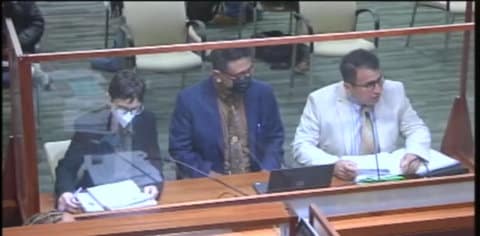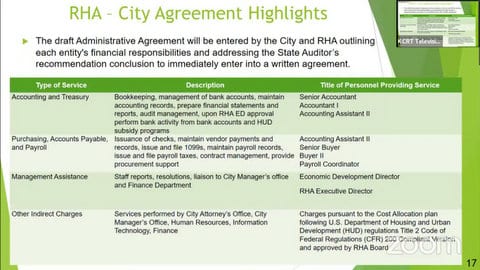
07 Jun Five-Year Forecasts See Budget Deficit Coming for Richmond

Finance Department staff for the city of Richmond speak at the June 6 Richmond City Council meeting. (Screenshot captured by Samantha Kennedy / The CC Pulse)
By Samantha Kennedy
Richmond just got a glimpse into its future. Or, at least, the future it’s planning for.
At its Tuesday meeting, the Richmond City Council received a presentation from city staff on next year’s proposed budget that included the draft of a five-year financial forecast. Three scenarios were presented: optimistic, middle-of-the-road and pessimistic.
The optimistic scenario assumes that revenue streams will see growth faster than they do in the middle-of-the-road and pessimistic scenarios. The pessimistic scenario accounts for more unpredictable times an economy may face, like recessions. Each is based on the city’s historical trends in revenue and makes the assumption that staffing is consistent.
In all scenarios, there was eventually a budget deficit. Many revenue streams that are expected to increase within the next year saw a significant drop-off after the 2024-25 fiscal year, which became steady over time.
“The farther out we go is usually the more conservative the forecast becomes,” said accounting manager Antonio Banuelos. “We include known factors.”
Banuelos said one example of this is the recently approved franchise agreement with PG&E, which gives the utility company permission to distribute its product within city limits. City Council passed two ordinances last month updating the company’s tax responsibilities on electricity and gas distribution.
Revenue from this source will be higher during the 2024-25 fiscal year because it will be fully implemented; however, there is a large decrease in the following years due to unknown factors.
Next year’s proposed budget anticipates that several revenue streams will increase the entire budget by nearly 5% compared to the current year’s.
The biggest increases in revenue come from the Utility Users Tax and licenses, permits & fees categories. Revenue from the Utility Users Tax is expected to increase by 9.66% next year. In licenses, permits & fees, which includes the Measure U business tax, revenue is projected to increase by almost 20%.
A part of the five-year forecast included a pension update regarding CalPERS, which manages retirement for public employees. Richmond, like many other cities, faces high pension costs.
Richmond has over $380 million in CalPERS debt, and that amount is expected to increase. CalPERS has continually gotten more costly, yet produced smaller investment returns and started requiring payments in a shorter time-frame. Historically, CalPERS saw investment returns over 10%, which meant better-funded retirement plans, but returns have not reached those numbers in decades.
Michael Meyer, vice president of NHA Advisors, told the council that CalPERS has been changing its assumptions of expected investment returns. This “directly increases” the unfunded liabilities for everyone, including Richmond.
Meyer calls unfunded liabilities a “layer cake” because each has its own repayment period that has to be managed alongside one another.
“It’s very hard to predict, and it’s hard to budget for,” Meyer said. But there are ways to reduce this uncertainty.
Some solutions, like pension tax override revenues, are already implemented by the city. Richmond is one of the few cities that can use property tax to help pay for pension costs. Eighty-two percent of Richmond’s pension costs can legally be covered by these override revenues, but only about half of pension costs can actually be covered because of rate constraints. In addition to pension tax override revenues and prepaying unfunded liabilities, Richmond can also pay extra to CalPERS directly or through a trust to reduce liabilities.
The next Richmond City Council meeting is scheduled for June 20.






No Comments